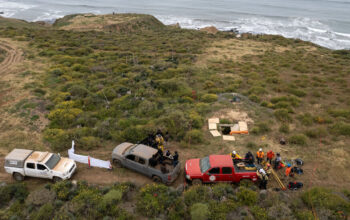I’ve written a lot lately about America in the 1960s and the way that the backlash to civil rights paved the way for the modern Republican Party’s hard-line positions on gun control and abortion bans. But I haven’t spent as much time looking at what happened within the Democratic Party that enabled that seismic shift to happen. So this week I’ve been remedying that with a giant stack of vacation reading:
-
“Racial Realignment: The Transformation of American Liberalism, 1932–1965,” by Eric Schickler, makes the case that the Democrats’ embrace of civil rights is not, as is commonly perceived, a top-down elite project that happened in the 1960s but rather a bottom-up pressure campaign in which lower-level Democratic constituencies, particularly the industrial labor unions of the northern states, pressured the party to adopt the cause of civil rights.
-
To understand why that happened, it’s crucial to understand the Great Migration, the massive exodus of Black Americans out of the South and into northern cities. They went on to become an important constituency for the union movement and for the Democratic Party, building grass-roots pressure for the adoption of a civil rights platform. So to better understand that period, I’m going back to Isabel Wilkerson’s Pulitzer Prize-winning “The Warmth of Other Suns: The Epic Story of America’s Great Migration.”
-
To broaden my historical frame, I’ve picked up “What it Took to Win: A History of the Democratic Party” by Michael Kazin, which traces the history of the party from Andrew Jackson to Joe Biden, and includes an analysis of the party’s modern era of urban cosmopolitanism.
-
And for a retrospective pop culture metaframe, I also watched “The Trial of the Chicago 7,” Aaron Sorkin’s dramatization of the 1968 trial of a group of anti-Vietnam War protesters, which A.O. Scott described in his Times review as “a Very Special Sober Episode of ‘Drunk History.’” Someday, I will write the essay that’s been percolating in my head for years about Sorkin’s work mapping the blind spots of American liberalism. Today is not that day.
Books bringing you joy this summer
Kate Godfrey, a reader in Oakland, Calif., recommends “Joan is Okay” by Weike Wang:
There it was on the shelf of the local library. I’m a retired graphic designer. I loved the cover. No expectations about the text. Inside was a story about a dedicated medical professional questioning the meaning of life and family. A brilliant gut-punch story about loyalty to oneself and others.
Christina Arrostuto, a reader in Auburn, Calif., recommends “New York, New York, New York: Four Decades of Success, Excess and Transformation” by Thomas Dyja:
I expected to learn more about my beloved city. What I didn’t expect was a thorough yet concise, cogent and insightful recount of the social, political, economic and humanistic forces that have swept not just New York but the U.S. as a whole over my baby-boomer lifetime. Mr Dyja crafted an anthropologic mosaic that brings all our current joys and woes into sharp relief. Between the lines, I could see a road map for both continuing on paths that trend to progress in bettering our society and, while daunting, changing course on issues that have caused so much suffering.
What are you reading?
Thank you to everyone who wrote in to tell me about what you’re reading. Please keep the submissions coming!
I want to hear about things you read (or watched or listened to) that made you realize you were wrong about something, no matter how seemingly minor the revelation was. Tell me what it was and how it changed your mind.

